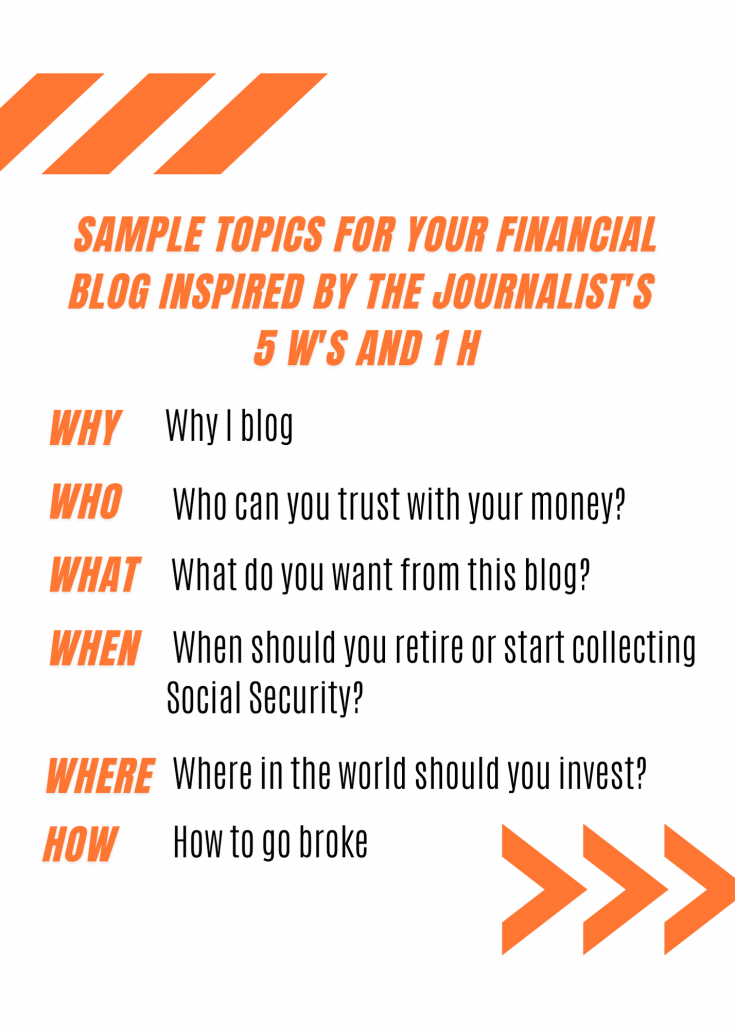Do you want to begin with finance but don’t know where to start? In this blog post, we outline the basics of writing a successful finance blog. Tips and tricks for new bloggers are provided, along with a list of resources to get you started.
Tips For Writing A Successful Finance Blog
#1. Plan Your Blog

Image Source: Investmentwriting
If you’re considering starting a finance blog, the first thing to do is make a plan. What kind of topics do I want to write about? Who is my target audience? And what are my goals for the blog?
First and foremost, do not forget that a finance blog doesn’t need to be dull all the time. You can inject a little of yourself through your writing. Your readers will appreciate this as you will when you’re making the blog a little bit more interesting to write.
#2. Now That You Know What to Write, Discover Your Niche
If you are a finance blogger, chances are you’re searching for ways to stand out in the crowd. Why? Because there are already more than enough of them, there are just too many finance blogs. So, how do you make your blog stand out? That’s simple: find your niche.
One way to find your niche is by focusing on just one aspect of finance that particularly interests you. Maybe you enjoy writing about saving money, investment, or debt management. Or maybe you would like to write specifically for a particular audience.
#3. Interesting name and domain
When financing blogging, among the most important things you can do is have a catchy name and domain.
But it will make you stand out from the crowd and attract more readers. Here’s how to choose a fantastic name and domain for your finance blog:
Be straightforward. A confusing name and/or domain is just as likely forgotten or ignored.
- Keep it relevant to your niche. A name that reflects the topic of your blog shows readers what to expect.
- Using keywords. If you want your blog to be found easily by potential readers, key it in your name and your domain.
- Be creative. Do not be afraid to get creative with your name and domain because, after all, you want to stand out from the others!
#4. Design a sleek-looking and professional website
Any business needs a well-thought-out website, but if the nature of the website is about finance, it has to be best designed. Therefore, as stated before, any visitor needs to be able to find the information he/she needs when they come to visit your website in a very easy and fast manner. There ought to be no crowded mess; headings and white spaces abound.
This should not be messy or amateurish. Hence, the color scheme should be professional and easy on the eye, while the font should be readable. Images should not be overdone but only used if they add content value.
#5. Quality content
Anyone who has ever attempted to write a finance blog will agree that it is not an easy thing to do. There are so many things to consider, starting from selecting topics to what approach to use in their writing. The piece comes out both informative and, at the same time, interesting to the readers.
Here are some tips on how to create quality content for your finance blog:
- First, the topics should be interesting and useful to your audience. While your topics should be timely and relevant, it’s always important to pick topics in which you can show some passion.
- Second, take time to really research your topics. This entails more than reading articles from the internet; you need to talk to experts and gain first-hand experience wherever possible.
- Finally, now that you’ve done your research, it’s time to start writing. As you draft your posts, make them clear and concise; use straightforward terms to explain concepts so clearly that they become oversimplified. Don’t forget to proofread before publishing!
#6. Promote your blog
If you are going to be writing a finance blog, there are a few things that you may do to promote it. For starters, make sure that your blog is well-written and informative.
Valuable content will attract and retain readers to your blog. Furthermore, guest posting for other blogs that have a finance focus and participation in online forums where people discuss personal finance can also be used to promote your blog.
On the other hand, letting your blog be known through social media will bring you new readers. Through busy promotional time, you can create an audience of engaged readers who appreciate your insights on financial matters.
Conclusion
A good blog takes a lot of time and effort to develop, so be prepared for a lengthy process. In addition to writing quality material and promoting your blog, you also need to stay current on important industry trends and issues.
All you really need to do to get started, though, is pick a subject that you have a strong interest in, come up with the ideal blog name, choose a WordPress.org blog server, and pick a theme that works well for your audience and brand.

